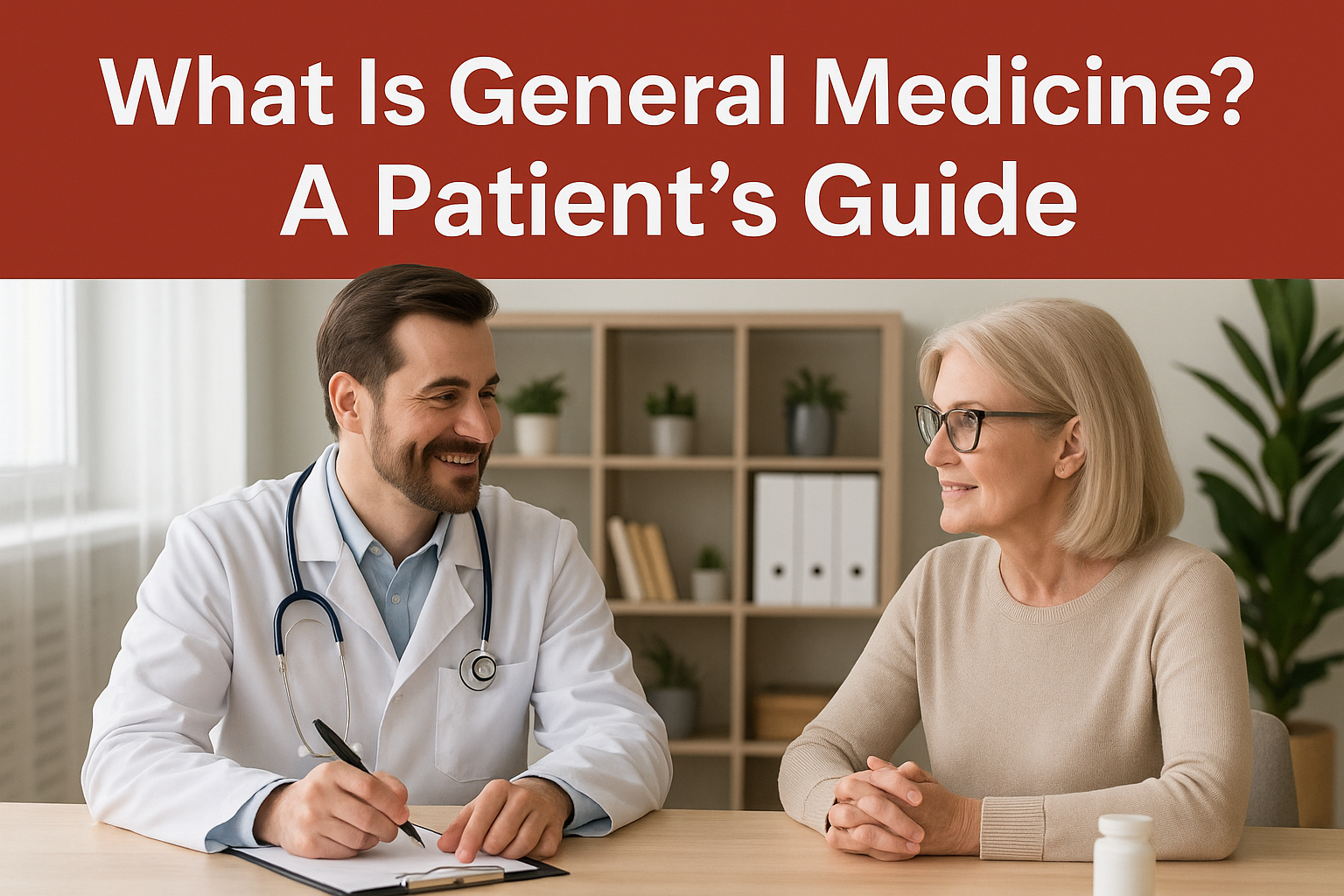
-
Posted By admin
-
-
Comments 0
What Is General Medicine? A Patient’s Guide
General medicine, also referred to as internal medicine, serves as the foundation of modern healthcare. Whether you’re experiencing persistent fatigue, unexplained aches, or simply need routine checkups, general medicine practitioners are often the first line of care.
But what is general internal medicine exactly? Let’s break it down for a clearer understanding of what patients in Ajman, Dubai, and across the UAE can expect when visiting a general physician.
What Is General Internal Medicine?
General internal medicine is a medical specialty focused on the prevention, diagnosis, and non-surgical treatment of adult diseases. Doctors who specialize in this area are known as internists or general physicians. They are trained to handle a wide variety of conditions that affect internal organs—such as the heart, lungs, liver, kidneys, and digestive system.
Internists are not limited to a single organ or disease type. Instead, they look at the whole patient, especially when symptoms are complex or multiple illnesses are involved. Understanding what is general internal medicine helps patients make more informed decisions about their health.
The Role of a General Physician
In many parts of the UAE, including General physician Ajman clinics, general physicians act as gatekeepers to specialized care. They assess symptoms, provide treatment, and refer patients to specialists when needed.
Key responsibilities include:
- Managing chronic illnesses like diabetes and hypertension
- Treating acute illnesses such as infections and fevers
- Performing health screenings and preventive checkups
- Coordinating with specialists for comprehensive care
Common Conditions Treated in General Medicine
General internal medicine covers a wide range of illnesses, especially those common in the UAE due to climate, diet, and lifestyle factors.
Condition | Description | Common Symptoms |
Hypertension | High blood pressure | Headaches, dizziness |
Diabetes | High blood sugar levels | Fatigue, excessive thirst |
Respiratory Infections | Viral or bacterial lung infections | Cough, fever, shortness of breath |
Gastrointestinal Issues | Digestive tract disorders | Nausea, abdominal pain |
Allergies | Environmental or food reactions | Sneezing, skin rashes |
Understanding the symptoms early helps internists make accurate diagnoses and begin treatment before complications arise.
What to Expect During a Visit
Visiting a general medicine clinic in Ajman or Dubai is a straightforward experience. Here’s what you can generally expect:
1. Medical History Review
The physician will inquire about your symptoms, lifestyle habits, previous medical conditions, and medications.
2. Physical Examination
A complete examination is done to identify any external signs of illness.
3. Diagnostic Tests
Lab tests or imaging may be recommended to confirm any suspicions. These may include blood work, urine tests, or ECGs.
4. Treatment Plan
Based on findings, a tailored treatment plan is created. This could include medications, lifestyle changes, or further consultations.
When Should You Visit a General Physician?
Recognizing the right time to visit can make all the difference in your health outcomes. You should consider seeing a general medicine specialist if:
- You experience persistent symptoms (e.g., fatigue, unexplained pain)
- You need a routine check-up or vaccination
- You have a chronic condition requiring regular monitoring
- You’re unsure of which specialist to see—internists can guide you
According to the World Health Organization, non-communicable diseases like heart disease and diabetes account for over 70% of global deaths. Early intervention from general medicine practitioners plays a critical role in reducing these risks.
Key Takeaways
- General internal medicine focuses on adult disease prevention, diagnosis, and management.
- It covers a wide range of chronic and acute conditions.
- Internists offer comprehensive care and guide patients to specialized services when needed.
- Early and regular checkups can help detect potential issues before they become severe.
- Clinics like those offering General physician Ajman services are easily accessible and critical for community health.
“The good physician treats the disease; the great physician treats the patient who has the disease.”
– William Osler, Father of Modern Medicine
FAQs
1. What is general internal medicine and how is it different from family medicine?
General internal medicine focuses exclusively on adults, managing complex diseases and chronic conditions, while family medicine treats patients of all ages and often includes minor surgical procedures.
2. Do general internists perform surgeries?
No, internists do not perform surgeries. They specialize in non-surgical treatment methods but may refer you to a surgeon if needed.
3. How often should I see a general internist?
It depends on your health status. Healthy adults should aim for an annual check-up, while those with chronic conditions may require more frequent visits.
4. Can general internists treat mental health conditions?
Yes, they can treat common mental health issues such as anxiety and depression or refer patients to mental health specialists when necessary.
5. Is general internal medicine covered by insurance in the UAE?
Most health insurance plans in the UAE cover visits to general physicians. It’s advisable to confirm with your provider for specific inclusions.
Conclusion
Knowing what is general internal medicine empowers you to take charge of your health. Whether you’re dealing with a chronic illness or just need a yearly check-up, visiting a general physician is often the most important first step toward better well-being.


